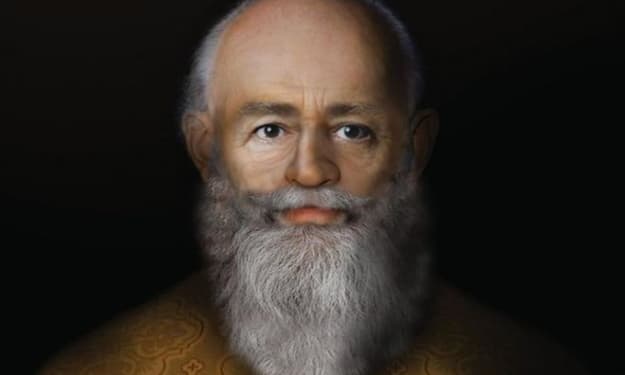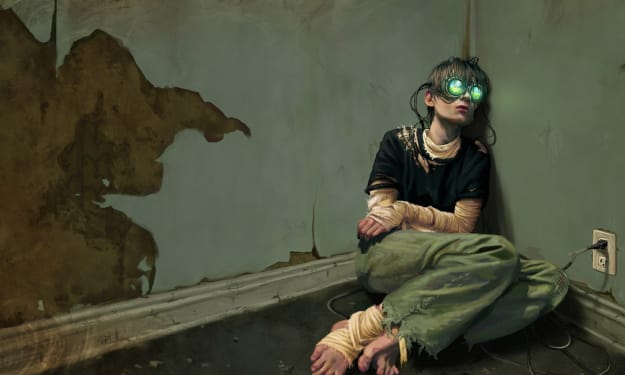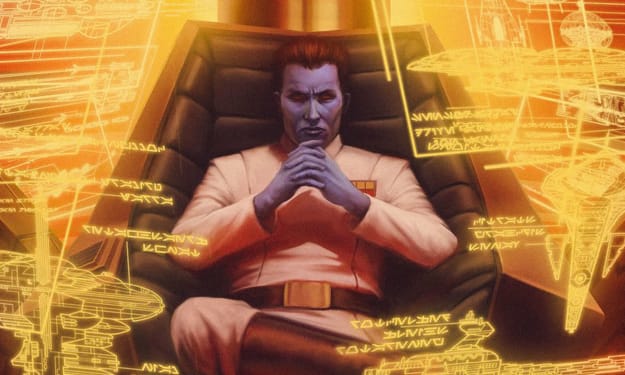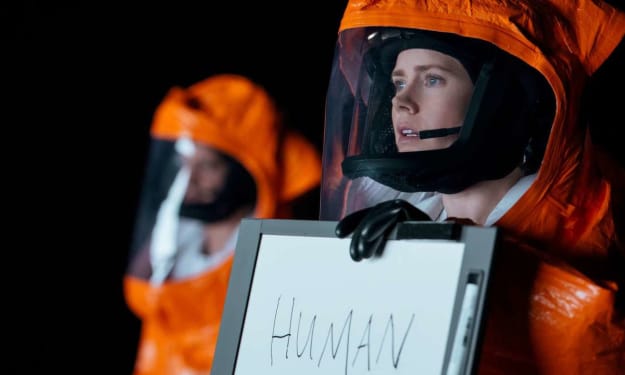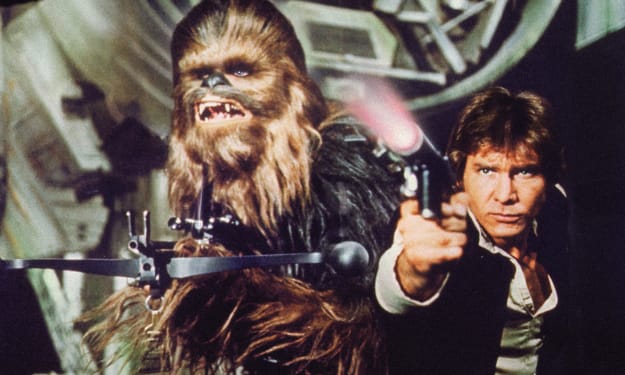literature
Science fiction's most popular literary writers from Isaac Asimov to Stephen King and Frank Herbert, and the rising stars of today.


The Hot War: Bombs Away
Harry Turtledove doesn’t identify as an alternate history writer, but rather as “a historian who writes science fiction.” Bombs Away isn’t quite what most readers would think of as science fiction, but this alternate history novel does deal a lot with the science of nuclear weapons, fallout, and contamination. Turtledove delivers another masterfully crafted novel that provides a frighteningly plausible picture of World War III, or when the Cold War turned Hot.
Zach FosterPublished 7 years ago in Futurism

Excerpt from 'Somewhere in the Skies: A Human Approach to an Alien Phenomenon' by Ryan Sprague
Ordinary people are seeing extraordinary things in our skies. And while reports of UFOs and their possible occupants are littered with dates, times, and descriptions, they rarely focus on those who've actually experienced them. How have these dramatic and often traumatic events affected those involved? Could both the positive and negative implications, whether subtle or revelatory, further our knowledge of what exactly these phenomena represent?
Ryan SpraguePublished 7 years ago in Futurism

Reconstructing Lynch's 'Dune:' A Look at 'Dune Redux'
Once you’ve watched a few fan edits (also known as fan cuts) of commercially released feature films, you come to appreciate the extraordinary power of editing to change a movie. I found that particularly true with David Lynch'sDune.


Antimatter: X-mas Files Edition
Sure. Sure. The Christmas season is full of crass commercialism. Materialist dogma -- of all varieties -- are on display everywhere. But the season has traditionally been regarded as a time of supernatural activity and high strangeness, as this edition of Antimatter shows.
Matt SwaynePublished 7 years ago in Futurism

Interview with Mike Resnick
At 74 years old, Mike Resnick is only hitting his stride. Just last week he handed in the eighth book he wrote this year, and he has clocked in 13 short stories and just sold a fantasy trilogy to DAW Publishing. He has mentored countless authors, including Nebula award nominee Martin Shoemaker and is the recipient of five Hugos (from a record 37 nominations) and is first on the Locus list of all-time award winners, living or dead, for short fiction, and is fourth on the list of Science Fiction's all-time top award winners in all fiction categories. Resnick is also the editor of Galaxy's Edge, one of the field's leading magazines.
Joshua SkyPublished 7 years ago in Futurism

The Mechanism
The Mechanism EXT. WASTELAND - DAY A morbid landscape: the smoking aftermath of a war in a 1950's American city. The high pitched screams of death rays erupt from a section of fallen buildings.
Omar AttiaPublished 7 years ago in Futurism

The Legacy of Hard Science Fiction
Hard science fiction embodies the essence of the genre, though science fiction does not always adhere to its principles. They do not call it science fiction for nothing, though sometimes it might seem that way. The mushy physics, galaxy-hopping adventures, and even outright mysticism of Star Wars and Star Trek may hark back to the pulp science fiction of E. E. "Doc" Smith and Edmond Hamilton, but they do not say a lot for the average level of science education among Hollywood producers. Nevertheless, there is a long and healthy tradition of more scientifically faithful science fiction, running from Jules Verne and H. G. Wells through writers of the 1930s, 1940s, and 1950s (think of Arthur C. Clarke and Hal Clement) and on into the 1960s and 1970s in the hands of Larry Niven, Gordon R. Dickson, and others. Hard science fiction stands for some readers as the true heart and soul of the genre, and it continues vigorously today, as is evidenced by a look at publications since the Golden Age of science fiction.
John FoleyPublished 7 years ago in Futurism

Can Science Fiction Predict the Future?
"Well, you know, William Gibson was writing about that in 1984." It's become a running joke among my friends that I say something like this every few months, usually when discussion turns to the increasingly science fictional resonances of our everyday world. Science fiction writers can be a prescient lot, by trade. But William Gibson, in particular, has a remarkable track record for what seems like genuine prophecy, starting with his very first short stories, published in—surprise—OMNI magazine.
Glenn McDonaldPublished 7 years ago in Futurism

Irving Wallace Predictions of That Came True
Irving Wallace is a name from the past. If you are a Gen-X kid, you may have grown up in a world where every bathroom featured The Book of Lists, Wallace’s book (with kids Amy Wallace and David Wallechinsky—he had to take the old man’s Ellis Island name, huh?) that updated to The Guinness Book of World Records in the hip 70s. Why, just yesterday, before I wrote this article, I posted for friends Irving Wallace’s mind-blowing 1972 movie The Man, in which a fateful plane accident causes president pro tempore of the Senate James Earl Jones to become the President. A black President?! 1972 America’s collective mind is blown. Halfway between the Dr. Strangelove airplane and Darth Vader, JEJ is, of course, a magnificent voice and a majestic avatar of human dignity. Burgess Meredith—you know, Rocky’s trainer—plays the evil sculduggerous Southern teabagger who plots President Vader’s ruin.
Matthew WilderPublished 7 years ago in Futurism

Thrilling 'Star Wars' Audio Books
Travel to a galaxy far, far away and never leave the comfort of your sedan. Any commute can be improved with a little help from the soothing sounds of a Wookiee. Audio books are a great way to immerse yourself in the alternate universe that has captured generation after generation. These Star Wars audio books offer the intense action of a movie with the in-depth narrative of a novel that can be enjoyed almost anywhere. Imagine you are sitting in bumper to bumper traffic on your way home from a long day at the office, only to have the speakers of your car blaring the the struggle of Yoda trying to instill peace on Djun, an inventive tale of good versus evil or a narration that follows Princess Leia, Han Solo, and Luke Skywalker as the rebels' last hope. Your favorite Star Wars moments are now reimagined and reinvented in an advancement that is the way of the future. Dread traffic no more with the most thrilling Star Wars audio books.
James LizowskiPublished 7 years ago in Futurism

Word-Worlds
Ted Chiang is among the greatest short story writers in the history of science fiction, and I've been recommending his work to students for years. That said, I was somewhat disappointed by Arrival, Denis Villeneuve's recent film adaptation of Chiang's masterful short story "Story of Your Life." The film, in my view, is too noncommittal genre-wise. It doesn't know what it wants to be—action-adventure or philosophical meditation, Independence Day or Ex Machina. I suppose there's a way to elegantly split that difference, but I don't think it happens here. To be fair, it's a tough story to adapt: high-concept, but cerebral and exposition-y. "Story of Your Life" features none of the fate-of-the-Earth-hangs-in-the-balance testosterone of Arrival; what's most interesting about it is the peculiar linguistics of the alien language, particularly the written script, which Chiang's narrator explores in depth. The film dumbs all this down. We get squiddy aliens ejaculating ideograms, and some montage-like scenes of Amy Adams' character trying to decipher them at her desk, but we're not really privy to her insights, and, though a major plot twist depends on it, we never get the full picture of how the aliens' language is a natural outgrowth and/or determinant (or both?) of their relationship to time, which is, or ought to be, the story's great payoff.
M. Thomas GammarinoPublished 7 years ago in Futurism

Best 'Star Wars' Han Solo And Chewbacca Books
Every Star Wars fan knows the famous duo of Han Solo and Chewbacca well. While Han Solo was a human smuggler known for being a member of the Rebel Alliance and later the New Republic, he originates from the planet Corellia where he was orphaned at an early age. Taken by the pirate Garris Shrike to serve with his crew, Han was treated cruelly, which is the main reason he became a smuggler. After entering the Imperial Academy at Carida where he served with distinction, his life changed when he refused to beat a Wookiee named Chewbacca with a neuronic whip and the two eventually fled from the imperials together. That was the moment Han Solo and Chewbacca bonded, and Chewbacca became his partner in crime as his life debt to Solo. The adventures of Han Solo and Chewbacca are present in many Star Wars books. Here are our picks for the best Han Solo and Chewbacca books.
James LizowskiPublished 7 years ago in Futurism







